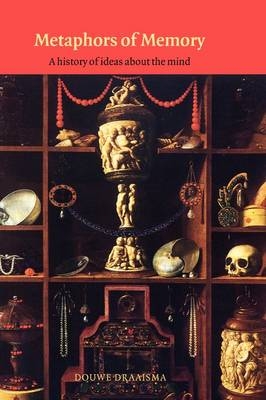
Metaphors of Memory
A History of Ideas about the Mind
Seiten
2000
Cambridge University Press (Verlag)
978-0-521-65024-3 (ISBN)
Cambridge University Press (Verlag)
978-0-521-65024-3 (ISBN)
What is memory? Elusive and difficult to define, philosophers and psychologists through the ages have used metaphors as a way of understanding it. First published in 2000, this fascinating book takes the reader on a guided tour of these metaphors of memory from ancient times to the present day.
What is memory? It is at the same time ephemeral, unreliable and essential to everything we do. Without memory we lose our sense of identity, reasoning, even our ability to perform simple physical tasks. Yet it is also elusive and difficult to define, and throughout the ages philosophers and psychologists have used metaphors as a way of understanding it. First published in 2000, this fascinating book takes the reader on a guided tour of these metaphors of memory from ancient times to the present day. Crossing continents and disciplines, it provides a compelling history of ideas about the mind by exploring the way these metaphors have been used - metaphors often derived from the techniques and instruments developed over the years to store information, ranging from wax tablets and books to photography, computers and even the hologram. Accessible and thought-provoking, this book should be read by anyone who is interested in memory and the mind.
What is memory? It is at the same time ephemeral, unreliable and essential to everything we do. Without memory we lose our sense of identity, reasoning, even our ability to perform simple physical tasks. Yet it is also elusive and difficult to define, and throughout the ages philosophers and psychologists have used metaphors as a way of understanding it. First published in 2000, this fascinating book takes the reader on a guided tour of these metaphors of memory from ancient times to the present day. Crossing continents and disciplines, it provides a compelling history of ideas about the mind by exploring the way these metaphors have been used - metaphors often derived from the techniques and instruments developed over the years to store information, ranging from wax tablets and books to photography, computers and even the hologram. Accessible and thought-provoking, this book should be read by anyone who is interested in memory and the mind.
Introduction; 1. The mystic writing-pad; 2. Memoria: memory as writing; 3. The splendour of the Bologna Stone; 4. A vast labyrinth; 5. A mirror with a memory; 6. Digital memory; 7. Holographic memory; 8. An enchanted loom; 9. The homunculus.
| Erscheint lt. Verlag | 7.12.2000 |
|---|---|
| Übersetzer | Paul Vincent |
| Zusatzinfo | 20 Halftones, unspecified; 20 Line drawings, unspecified |
| Verlagsort | Cambridge |
| Sprache | englisch |
| Maße | 178 x 254 mm |
| Gewicht | 660 g |
| Themenwelt | Geisteswissenschaften ► Psychologie ► Allgemeine Psychologie |
| Geisteswissenschaften ► Psychologie ► Biopsychologie / Neurowissenschaften | |
| ISBN-10 | 0-521-65024-0 / 0521650240 |
| ISBN-13 | 978-0-521-65024-3 / 9780521650243 |
| Zustand | Neuware |
| Haben Sie eine Frage zum Produkt? |
Mehr entdecken
aus dem Bereich
aus dem Bereich
wie Affekte innere Entwicklung ermöglichen
Buch | Softcover (2023)
Klett-Cotta (Verlag)
30,00 €
Buch | Softcover (2024)
Hogrefe Verlag
34,95 €


